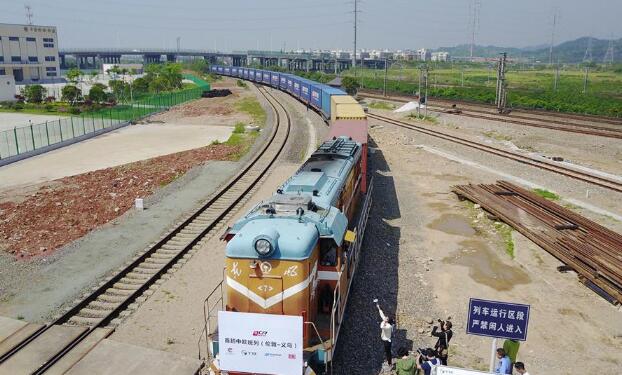London keen on BRI
- By Sumantra Maitra
 0 Comment(s)
0 Comment(s) Print
Print E-mail China.org.cn, May 17, 2017
E-mail China.org.cn, May 17, 2017
|
|
|
The first London-Yiwu cargo train carrying British products arrives at Yiwu West Station in Yiwu, east China's Zhejiang Province, April 29, 2017. London is the 15th European city on an expanding map of destinations for China's rail cargo. The first Chinese freight train arrived in London in January. [Photo/Xinhua] |
He was speaking in Beijing at the opening of the first Belt and Road forum, in front of thousands of delegates and 29 world leaders. This is a sign of several things about the nature of Brexit, as well as the direction Sino-British relations are going.
This comes after Chinese President Xi Jinping pledged $124 billion to benefit the $900 billion plan, now being considered the most ambitious development project in the history of globalization.
It calls for free trade and an end to diplomatic power politics. The British media wasn't slow to dub President Xi as the new "globalization guru."
In stark contrast to Donald Trump's America First approach, Xi said: "We should build an open platform of cooperation and uphold and grow an open world economy." The plan formally called the Belt and Road Initiative (BRI) was unveiled in 2013, and now expanded to encompass all of Asia, Africa, and Europe.
President Xi said the multi-billion-dollar infrastructure project is meant to usher in a second "golden age" of globalization, adding: "The glory of the ancient Silk Road shows that geographical dispersion is not insurmountable."
In what was a clear departure, from traditional politics, this speech was laden with historical examples. "These pioneers won their place in history not as conquerors with warships, guns or swords, but are remembered as friendly emissaries leading caravans of camels and sailing treasure-loaded ships. This part of history shows that civilization thrives on openness and that nations prosper from exchange."
It seems like London also understands that. Chancellor Hammond declared: "I commend President Xi for setting in train such a bold and visionary project. This initiative is truly ground-breaking in the scale of its ambition, spanning more than 65 countries, across four continents, with the potential to raise the living standards of 70 percent of the global population."
Two things are instantly clear from such a statement. One, Brexit is a very different phenomenon from Trump's win in the American presidential election. Britain voted to leave the EU not because of isolationism, but because of fears over uncontrolled immigration and over-regulation.
In fact, Britain is not at all isolationist like the America of Donald Trump. In fact, the U.K. is quite keen to showcase a growing Sino-British alignment on trade, not just because it needs alternative funding – and it surely does – but because it is actually keen on diversifying trade. This was British grand strategy during the years of the previous government of David Cameron, and barring the small Hinkley Point issue, it is quite clear U.K.-China trade is back on track.
Second, Britain is interested to promptly signing a free trade deal with China as it exits the EU. Beijing, while initially wary of an imploding EU, quickly realized that U.K. is a much better trading destination than the EU with all its tariff and problems.
The difference on the British and German approach to the BRI is visible. While German Trade and Economy Minister Brigette Zypries stressed the need for transparency and focused on adherence to international standards, there were no such demands from the British side, keen on having a trade deal first to show it's interested in being a reliable partner in this project.
As Chancellor Hammond said: "As China drives forward the Belt and Road Initiative from the East, we in Britain are a natural partner in the West, standing ready to work with all Belt and Road partner countries to make it a success."
Hammond's key point was that Europe and China were always connected since ancient history through trade, regardless of system of governance or society, and that is something which is coming back, and is to be welcomed.
Sumantra Maitra is a columnist with China.org.cn. For more information please visit:
http://www.china.org.cn/opinion/SumantraMaitra.htm
Opinion articles reflect the views of their authors only, not necessarily those of China.org.cn.







Go to Forum >>0 Comment(s)